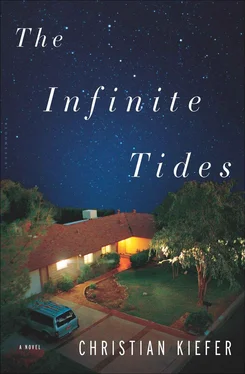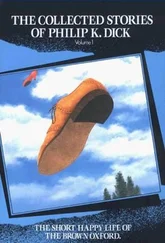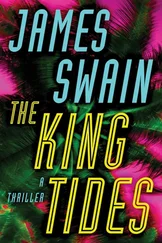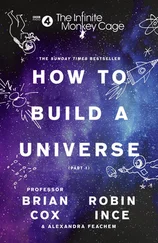“Yeah, awesome.” She sat looking at the paper, at the pencil marks they had both made upon it.
“Glad you’re having fun.”
“Yeah,” she said. “This is heavy stuff.”
He smiled again. “Wait until something you do is in space,” he said. “That’s the heavy stuff.”
“Yeah.” She looked up at him now. Perhaps she saw him then differently than she had before or perhaps she was just looking at her father. He did not know and would never know. But she looked at him for a long time and said nothing and then her eyes returned to the paper again.
“So about that,” he said. “I have some news.”
“You heard?”
“I heard.”
“Tell me tell me tell me.”
He paused and then he said, “I’m in.”
“Oh!” she screamed and she threw her arms around him. “I knew it. I knew you’d get in. I knew it.”
“Well, so did I,” he said, smiling. “I’m glad you’re excited.”
“Yeah, I’m excited. Of course I’m excited. It’s awesome news.” She released him and sat staring up at his face.
“So here’s the thing. Your mom and I have talked about it. You know the training is all in Houston?”
“Yeah, we’re moving. I get it. Bummer but OK.”
“No, wait, the idea your mom and I talked about is that I would fly back and forth. At least for a while.”
“What do you mean?”
“It would just be for a while. You know. Until we figured out how well it was working.”
“How often?”
“I’ll be home most weekends, I think.”
She looked away and then turned toward him again, her eyes luminous. She looked like a woman then, or like the woman she might become. “But you’ll hardly ever be here,” she said to him.
“I’ll be here every weekend.”
“Most weekends, you said.”
“Yeah, most weekends.”
“Then what about the rest of the week?”
“During the week I’ll be in Houston,” he said, “and some weekends I probably won’t be able to come home either.”
“Shit,” she said.
“Quinn.”
“Shit, shit, shit,” she said. Her eyes were already bright with tears.
“We think it’s the best idea.”
“How is that the best idea?”
“I’d be away those weekends even if you and your mother moved to Houston with me,” he said. The first tear slid down her cheek. “Look,” he said, “Your mom and I talked about it and we thought it would be better if you didn’t have to move again. I mean the school here seems really good and you’re learning all kinds of stuff I didn’t even know about until I was in college.”
“I don’t care about that,” she said.
“I know,” he said, “but it’s important.”
“No, it’s not.”
“Yes, it is. You’re gifted, Quinn.”
“It’s not my fault,” she said, and now the tears really started to come, pouring down her face, and he knelt next to her on the kitchen floor and pulled her toward him, her head tilting to his shoulder, her arms wrapping around him as she wept.
“Don’t say that,” he said. “It’s not anyone’s fault. It’s great. I’m proud of you.”
“I don’t want you to go.”
“I have to.”
“Why?”
“Because I’m going to be an astronaut.”
“Then let me come with you,” she said.
He tilted her away from him, his heart a hard burning knot in his chest. “You and I are different from normal people,” he said. “We have a gift. That’s why I have to be an astronaut and that’s why you have to stay here and learn, because that’s your gift.” The words came slow and halting, perhaps because he had never spoken of her ability in these terms. Or perhaps because he knew there were schools in Houston that could teach her, schools probably even better than the academy. But Barb had made her case and that discussion was over. And it would be easier for everyone this way: less turbulent, less confusing. This was what he told himself.
“I don’t care,” she said. Her tears had wet his shirt through at the shoulder but she had stopped crying.
“Yes you do,” he said. “It’ll be OK. You’ll see.”
And he believed it too, believed, in that moment, that the arrow he had made for himself would continue its long upward motion. As if there was no possibility of return, no aphelion or perihelion to chart the long spiral of his orbit around whatever false burning center he had made.
Know this. That the things that go into the fire are forever changed. That all you have ever done can be measured not by distance but by circumference. That these twin spirals of smoke: they are your life, rising in curls.
The screen read “Barb — mobile.” He tilted forward, the chair legs all returning to the floor with a single loud clack. He had been reading an article off his laptop screen and now he held the phone in his hand while it continued to buzz and vibrate, thinking that he would let the call go to voice mail, but then also knowing that if he did so she would only call him again. Like Peter’s apology, it was not something he could avoid and so he answered—“Hello”—and the voice at the other end was shrill and loud: “What the hell do you think you’re doing?” she said.
“About what?”
“That’s not your bank account; that’s our bank account!”
“What?”
“You know what I’m talking about,” she said. “How am I going to pay my bills?”
“What bills are those?” he said.
“Credit cards. Food. Gas. It’s not like life got free.”
He did not answer, looked instead at the blank wall before him, the strip of blue masking tape there. “I don’t know,” he said at last. “What was your plan?”
“What do you mean ‘plan’?”
“I mean plan. What are you asking me here, Barb?”
“I’m not calling to play games. That’s our shared bank account and you can’t just close it. I write checks from there.”
“Why don’t you open a new account in Atlanta?”
“That’s not the point.”
“Your point is … what then?” he asked.
“My point is that it’s a shared account.”
“How do you figure?”
“How do I figure? It’s a shared account. It’s our money not your money.”
“Did you put that money there?”
“Don’t play that game.”
“I’m not playing any game,” he said. He rubbed his forehead with his fingertips and stood.
“Yes, you are. Don’t play stupid. You know what I’m talking about.”
“Do I?” He moved to the sink and then to the cabinet. The tape there had been pulled off and reattached so many times that it no longer stuck at all, the blue strip dangling limply from the darkly stained wood. He opened the cabinet door and retrieved one of the chipped glasses.
“Yes, you do. I was raising our daughter. That’s how it works. You can’t just close the bank accounts.”
He filled the glass with tap water and then sat back down. “Why not?” he said.
“Why are you playing this game?”
“I’m not playing any kind of game,” he said. “I don’t understand what you’re saying.”
“Really? You don’t understand what I’m saying? It’s a shared account.”
“It was a shared account.”
“It’s still a shared account.”
“I don’t see how it could be,” he said.
“What are you talking about?” she said.
“You said you filed for divorce.”
“So?”
“So why would we share a bank account if we’re getting a divorce?”
“It’s called alimony, Keith.”
“Alimony?” he said.
“Yes, alimony. I spent the last seventeen years raising Quinn while you were trying to become an astronaut. I have no job skills. We get divorced and you pay alimony. That’s how it works.”
Читать дальше












